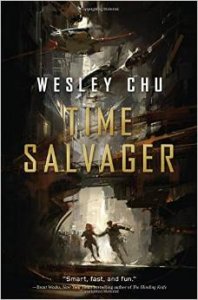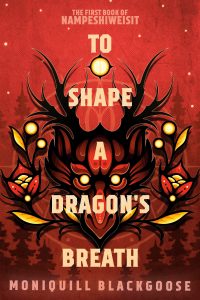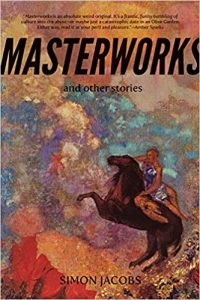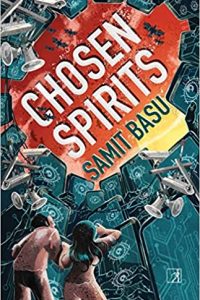Paul Di Filippo reviews Wesley Chu
Time Salvager, by Wesley Chu (Tor 978-0-7653-7718-0, $25.99, 384pp, hardcover) July 2015
 I was very impressed with Wesley Chu’s debut novel, The Lives of Tao, nominating it as an “overlooked book of 2013.” Whether my nomination had any good effect or not—really, any success was assuredly down to the author’s innate talents—Chu’s profile in the field has since assumed more prominence, and he completed the Tao trilogy to some acclaim.
I was very impressed with Wesley Chu’s debut novel, The Lives of Tao, nominating it as an “overlooked book of 2013.” Whether my nomination had any good effect or not—really, any success was assuredly down to the author’s innate talents—Chu’s profile in the field has since assumed more prominence, and he completed the Tao trilogy to some acclaim.
Alas, as so often happens, the brutal exigencies of a reviewer’s life meant that I did not have time to read The Deaths of Tao and The Rebirths of Tao. But hovering on the sidelines, I nonetheless felt confident they would maintain the same high standards of craft and entertainment.
Now, with his fourth book, Chu moves into a different fictional realm, and I get to see how he handles himself outside his freshman franchise, itself a useful and potentially revelatory assessment.
In this new venture, Chu is working with one of the great “power chords” of SF. (That’s the phrase Rudy Rucker coined to reference the seminal core tropes and novums like aliens, galactic empires, androids, et al.) His premise is that in the year 2511 there will exist an agency of time travelers whose duty it is to visit the past and steal precious artifacts of all sorts—without altering the timestream more than minimally—in order to replenish and fuel a dying contemporary economy. For, you see, the colonized Solar System of the 26th century is running on fumes, with Earth itself a dead planet, its ecosystems overwhelmed by the Terravira bug.
Immediately, this move puts Chu in illustrious company: Kage Baker, Isaac Asimov, Poul Anderson, Robert Silverberg, Steven Utley, John Varley—and Terry Gilliam, with his Time Bandits. When you add in the similar trope of ripping off parallel timelines—see Keith Laumer and Charles Stross, for example—the lineage becomes stupendous.
So the question is, can Chu live up to his literary ancestors and extend the chain even further? And considering this book is dedicated to Chu’s familial ancestors, I expect he feels this burden explicitly already.
Happily, I can report that this novel is worthy of its predecessors, stuffed with unforgettable action, packed with ethical conundrums, quivering with intellectual mindgames, all of these goodies conveyed to the reader in muscular yet balletic prose.
Chu’s first smart stroke lies in the creation of his alluringly flawed antihero, who is a true product of his debased age, the time of the Great Decay. Resembling one of Richard Morgan’s tough guys, James Griffin-Mars is a hardened, cynical chronman, part of an elite tasked by ChronoCom with making those smash-and-grab raids on the past. (And thanks to some nigh-magical technology known as “bands,” he is something of a posthuman as well.) After many years on the job, he is near the point of total burnout. Wouldn’t you be, after taking part in so many historical tragedies—the best venues for looting—and witnessing the deaths of so many unsavable souls? His friend and handler back at the base, Smitt, recognizes this, as does the martinet ChronoCom auditor, Levin Javier-Oberon. The bad dreams and hallucinations that are starting to plague James can’t be soothed even by his excessive drinking.
So when he is offered a big challenging assignment that might allow him to buy back his contract, he accepts. Plunging pastwards to the year 2097, he makes the mistake of falling in love with the bio-scientist Elise Kim. And when it comes time to jump back to 2511, he can’t just let her die, but instead violates the First Time Law and brings her with him.
Chu’s second good story-telling move is to divide his suspenseful narrative among James, Elise and Levin. Through Elise’s filter, we get an exterior perspective on the flaws and options of the year 2511 which the natives are blind to: almost a case of youth indicting age. And by riding the shoulders of Levin—whose full name, I think, is meant to echo that of Javert, the inspector from Les Misérables, thus making James our Jean Valjean—we experience the tragic nobility of a good man charged with upholding a bad system.
That precipitating event of James’s rebellion and transformation occurs roughly at the halfway point of the novel. What follows is a deadly cat-and-mouse game across time and space, centering around a “wasteland tribe” named the Elfreth, who live in the ruins of Boston. Not only is James’s life at stake, but also the lives of those he loves, and the fate of Earth itself. As one character opines, everything rests on “two scientists, an alcoholic…and a mud-wallowing tribe in the middle of a dystopian wasteland.”
In Chapter Thirty-three comes a major surprise, and the long extended climax is punctuated with plenty of enhanced superhuman battles like those we saw in Tao. The book ends on a satisfying note, but leaves itself open for sequels.
One intellectual toy common to this mode that Chu eschews is the time paradox. The book would not really benefit from such weird twists, and so Chu inserts a prohibition against revisiting over and over the same moment of time. But there is plenty of excitement without such enigmas.
I mentioned the high quality of the prose earlier, and I think that Chu has nailed a certain cinematic style (rich with good dialogue too) that does not avoid interior access to the hearts and minds of the characters. Consider the passage in Chapter Twelve when Elise is hanging from a collapsing structure, amid explosions, and James has to decide whether to rescue her or not. It’s all Michael Bay visuals, but with an underlying emotional resonance as well.
When you add up all the elements—great cast, high stakes, well-crafted language, new exfoliations of a classic premise—I think we can say with assurance that Chu is certainly on his way to a vibrant second stage of his career.
And so I think it’s only fitting, since Chu has, with this fine novel, come up to the high standards of past classics, that the Science Fiction Book Club tap Time Salvager as a selection-of-the-month, and advertise it with the same great line they once used long ago for Asimov’s The End of Eternity: “You Travelled Through Time to Taste FORBIDDEN LOVE…BUT NOW YOU MUST MURDER HER!”






